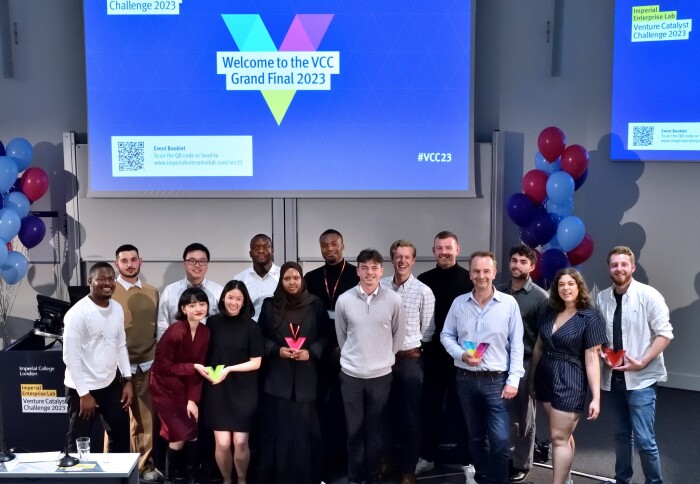Design Engineering students secure victory in Venture Catalyst Challenge 2023

Imperial College London's Dyson School of Design Engineering students and alumni emerge victorious in the esteemed Venture Catalyst Challenge 2023.
The annual entrepreneurial competition Venture Catalyst Challenge, organised by the Imperial Enterprise Lab, recognised exceptional talent and groundbreaking ideas with the potential to reshape industries. Two teams of Innovation Design Engineering (IDE) postgraduate students and alumni, Wateraware Collective and PulpaTronics, emerged as winners, leaving an indelible mark on the entrepreneurial landscape with their visionary solutions. Additionally, Fibe, a start-up founded by Design Engineering (MEng) alumni, earned the Moonshot Prize for challenging the status quo and pushing the boundaries of innovation.
This year's Venture Catalyst Challenge witnessed the participation of 25 of the most innovative teams, with a significant representation from the design engineering department. The competition encompassed five subject tracks, each offering a platform for teams to showcase their concepts. The ultimate prize for each track winner was a £10,000 award.
Revolutionising Water Monitoring
 In the fiercely competitive AI & Robotics track, Wateraware Collective, co-founded by recent IDE graduates Luisa Charles, and Ryan McClure claimed victory with their revolutionary modular sensing unit. Addressing the critical issue of water pollution, their device utilises low-cost sensors and cutting-edge machine learning algorithms to gather precise and uninterrupted data on pollutant levels. It can seamlessly attach to dry bags, kayaks, and paddleboards, enabling individuals to passively collect water quality data while engaging in water-related activities. This approach to water monitoring empowers people to contribute to the protection of vital water resources.
In the fiercely competitive AI & Robotics track, Wateraware Collective, co-founded by recent IDE graduates Luisa Charles, and Ryan McClure claimed victory with their revolutionary modular sensing unit. Addressing the critical issue of water pollution, their device utilises low-cost sensors and cutting-edge machine learning algorithms to gather precise and uninterrupted data on pollutant levels. It can seamlessly attach to dry bags, kayaks, and paddleboards, enabling individuals to passively collect water quality data while engaging in water-related activities. This approach to water monitoring empowers people to contribute to the protection of vital water resources.
“Our key goal is to bridge the water quality data gap. By partnering with water companies, indigenous communities, NGOs, schools and water enthusiasts, we are empowering the next generation to be guardians of the Earth. - Ryan McClure, MA/MSc Innovation Design Engineering’22
To learn more about their journey and insights, read about their interview with Imperial Enterprise Lab.
Paper-Based Alternatives for Sustainable Supply Chain Management
 PulpaTronics, designed by IDE students Chloe So, Barna Soma Biro, Rui Ma and Jingyan Chen won the Creative and Consumer track with their innovative solution poised to transform supply chain and inventory management. Introducing paper-based alternatives to traditional RFID tags, PulpaTronics minimises resource consumption, simplifies manufacturing processes, and streamlines recycling. Their design holds immense potential in reducing waste and environmental impact while ensuring an efficient and seamless supply chain.
PulpaTronics, designed by IDE students Chloe So, Barna Soma Biro, Rui Ma and Jingyan Chen won the Creative and Consumer track with their innovative solution poised to transform supply chain and inventory management. Introducing paper-based alternatives to traditional RFID tags, PulpaTronics minimises resource consumption, simplifies manufacturing processes, and streamlines recycling. Their design holds immense potential in reducing waste and environmental impact while ensuring an efficient and seamless supply chain.
Turning Potato Harvest Waste into Textiles
 In addition to these achievements, Fibe's work earned them a £10,000 prize as well, recognising their audacious vision and commitment to pushing the boundaries of innovation. Co-founded by Design Engineering (MEng) alumni Idan Gal-Shohet, David Prior Hope, Premal Gadhia, and Hazel Gonda, Fibe's approach involves developing textiles using potato harvest waste. This solution not only addresses sustainability concerns but also taps into the vast potential of agricultural by-products.
In addition to these achievements, Fibe's work earned them a £10,000 prize as well, recognising their audacious vision and commitment to pushing the boundaries of innovation. Co-founded by Design Engineering (MEng) alumni Idan Gal-Shohet, David Prior Hope, Premal Gadhia, and Hazel Gonda, Fibe's approach involves developing textiles using potato harvest waste. This solution not only addresses sustainability concerns but also taps into the vast potential of agricultural by-products.
The success of Wateraware Collective, PulpaTronics, and Fibe in the Venture Catalyst Challenge not only highlights the exceptional talent nurtured within the Dyson School of Design Engineering but also showcases the university's commitment to fostering innovation and entrepreneurship. For more information about the challenge, please visit Imperial Enterprise Lab's website.
Article text (excluding photos or graphics) © Imperial College London.
Photos and graphics subject to third party copyright used with permission or © Imperial College London.
Reporter
Sanjana Kakar
Department of Materials